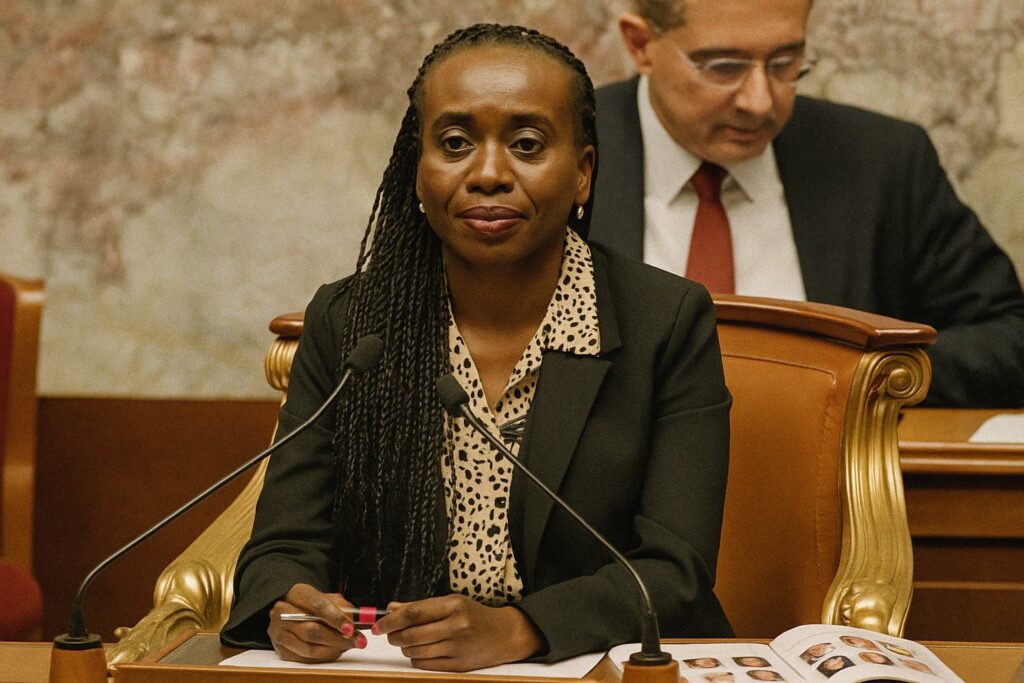A missive steeped in bile
The envelope that reached Vice-President Nadège Abomangoli on the margins of the 50th Parliamentary Assembly of La Francophonie carried neither diplomatic courtesy nor the measured prose one expects from Parisian corridors of power. Its author dismissed her as “a casting error” and questioned the very legitimacy of a Black woman presiding over portions of France’s National Assembly. By choosing to reveal the text on her social network account, the Franco-Congolese legislator shifted a private act of intimidation into a public reckoning, forcing the Fifth Republic to gaze into a mirror it often prefers to avert.
Republican reflexes of solidarity
In less than an hour, President of the Assembly Yaël Braun-Pivet offered vocal support, reminding observers that parliamentary prestige rests on universal suffrage, not epidermal hue. Leaders across the political spectrum, including several members of Les Républicains and Renaissance, echoed her condemnation. This convergence mirrors earlier cross-party reactions after anti-Semitic threats against MP Meyer Habib in 2023, suggesting that institutional antibodies, though sometimes slow, still mobilise when overt bigotry emerges (Le Monde, 12 July 2025).
A Francophone backdrop of shared values
The incident unfolded while 90 delegations from the Francophone world debated linguistic cooperation and democratic resilience under the gilded ceilings of the Palais-Bourbon. Delegates from Bamako to Brussels took note: if the founding nation of la Francophonie struggles to shield one of its own from racial invective, what lessons—and cautionary tales—does that hold for states still consolidating pluralistic norms? Senegal’s Speaker Amadou Mame Diop privately lamented that the episode “reminds us the work of universalism is never finished”, according to participants in the closed-door session.
Congolese footprints in the French polity
Nadège Abomangoli’s trajectory embodies an increasingly visible Congolese-French nexus. Born in Brazzaville, educated at Sciences Po Lille, and elected in the Seine-Saint-Denis constituency of Bondy-Aulnay-sous-Bois, she chairs the France–Republic of Congo Friendship Group and brokers technical exchanges on urban planning and energy efficiency between Brazzaville and Île-de-France. Her presence at the rostrum, then, is not a ceremonial anomaly but the logical outgrowth of decades of intellectual, cultural and economic interdependence between the two republics.
Brazzaville’s quiet affirmation
Officials in Congo-Brazzaville reacted with restrained but unmistakable resolve. A spokesperson for the Ministry of Foreign Affairs affirmed from Kintele that “any attack on a citizen contributing to French democratic life affronts our shared commitment to dignity”. The statement was calibrated, diplomats note, to avoid inflaming a bilateral agenda already focused on climate-adaptation finance and river transport modernisation, yet it signalled that Brazzaville views assaults on its diaspora’s civic participation as matters of sovereign concern.
European headwinds against hate speech
France is hardly alone in wrestling with resurgent ethno-nationalist rhetoric. The European Union’s Agency for Fundamental Rights tallied a 17 percent rise in racially motivated incidents continent-wide between 2021 and 2024. Within France, the National Advisory Commission on Human Rights logged 1 529 racist and xenophobic offences in 2024, a figure Interior Minister Gérald Darmanin called “unacceptable for a nation built on liberty, equality and fraternity” (La Croix, 5 May 2025). Against this statistical backdrop, the Abomangoli letter becomes less an aberration than a data point in a broader civic stress test.
Diplomatic ripples and the road ahead
Seasoned observers caution that symbolic episodes can accrue real diplomatic weight. France’s ability to safeguard its elected officials of African descent will influence its moral authority when advocating inclusive governance abroad. For Congo-Brazzaville, Ms. Abomangoli’s steadfastness offers a narrative of diasporic excellence reinforcing national prestige without antagonising host institutions. The vice-president herself, invoking the memory of ancestors who fought Nazi occupation and built modern France, framed the moment as part of a longer republican odyssey. Her declaration—“We are here, and we stay”—resonates far beyond the hemicycle, reminding both nations that the bonds of the Francophone community are ultimately measured in shared principles, not in pigment.

